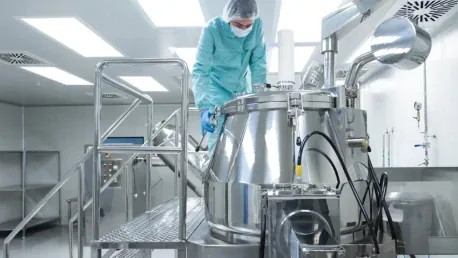The pharmaceutical industry’s research and development (R&D) landscape is undergoing a significant transformation as artificial intelligence (AI) and machine learning (ML) infiltrate its traditionally hands-on processes. Time-consuming procedures involving controlled environments, manual labor, and repetitive trial-and-error are being enhanced with AI, which promises increased efficiency and accuracy. A notable indicator of this revolution is Basetwo’s recent success in securing $11.5 million in Series A funding, an achievement highlighting the shifting paradigms in pharmaceutical manufacturing. This injection of capital aims to accelerate drug development and enhance production through sophisticated AI-driven solutions, setting the stage for a transformative era in the industry.
Revolutionizing Pharmaceutical Manufacturing
Pharmaceutical manufacturing has traditionally operated under challenging and time-bound conditions due to its reliance on extensive trial-and-error methods and complex scaling operations. Basetwo’s innovative approach integrates first-principles models from physical and chemical engineering with advanced ML algorithms. This hybrid model facilitates more accurate simulations of manufacturing processes, thus optimizing production cycles and addressing the intricacies often unaccounted for by conventional machine learning. This new approach reduces the dependency on manual labor while increasing precision in the manufacturing phases.
With AI’s increasing presence, the pharmaceutical industry is transitioning towards more streamlined processes that can significantly reduce the time required for drug delivery to patients. Basetwo’s groundbreaking platform emphasizes data integration, modeling and simulation, visualization and optimization, and operationalization and deployment. These features collectively enhance the manufacturing phase by allowing real-time data analytics, advanced simulation capabilities, and optimized production settings. Such improvements not only speed up the production timeline but also ensure higher quality and consistency in drug production.
Data Integration: The Foundation of AI-Driven Manufacturing
Basetwo’s platform integrates both offline and online data sources seamlessly, allowing for sophisticated data handling and pipeline creation through an intuitive drag-and-drop interface. This integration is crucial for ensuring that the data fed into ML models is accurate and ready for analysis. Tools for data cleaning, gap filling, and effective data transformation ensure that the information is reliable and comprehensive. Accurate and well-prepared data is essential for developing robust AI models that can achieve precise simulations and optimizations.
The ability to handle diverse data sources and formats is a significant advantage, as it allows for a more holistic view of the manufacturing process. By consolidating data from various stages of production, Basetwo’s platform can identify patterns and correlations that might otherwise go unnoticed. This comprehensive data integration is the foundation upon which the platform’s advanced capabilities are built. This allows for a more proactive approach, enabling manufacturers to anticipate issues and streamline production processes.
Advanced Modeling and Simulation
Users of Basetwo’s platform benefit from a user-friendly drag-and-drop editor and an extensive library of industry-specific models. The integration of ML with physics-based principles creates robust hybrid models, which significantly outperform traditional ML methods in predicting outcomes by filling gaps in process knowledge. This approach allows for more accurate simulations of manufacturing processes, leading to optimized production cycles. Such accuracy in modeling can prevent costly production errors and ensure higher quality outcomes.
The platform’s modeling and simulation capabilities enable engineers to test various scenarios and determine the most efficient production settings. By simulating different conditions and constraints, users can identify potential issues before they arise and make informed decisions to enhance the manufacturing process. This proactive approach reduces the need for costly and time-consuming trial-and-error methods. Engineers can optimize processes, thereby improving efficiency and reducing the risk of errors in various stages of production.
Visualization and Optimization: Enhancing Decision-Making
Engineers can overlay time-series datasets to identify trends and examine correlations that might be concealed. Advanced statistical tools such as principal component analysis aid in isolating critical factors affecting production outcomes. The platform’s “what-if” analysis capabilities empower users to test various scenarios and determine the most optimized production settings under different constraints. This allows manufacturers to predict the potential impact of different variables and adjust the process to achieve optimal results.
Visualization tools play a crucial role in enhancing decision-making by providing clear and actionable insights. By presenting data in an easily understandable format, Basetwo’s platform enables engineers to quickly identify areas for improvement and implement changes that enhance efficiency and product quality. This focus on visualization and optimization ensures that the manufacturing process is continuously refined and improved. The combination of visualization and sophisticated analytical tools drives more informed and effective decisions.
Operationalization and Deployment: From Theory to Practice
Optimized processes can be integrated with existing enterprise systems and deployed across teams through automated notifications and workflow integrations. Basetwo also supports exporting models to external simulation tools, ensuring applicability across diverse platforms. This seamless integration with existing systems is essential for ensuring that the benefits of AI-driven manufacturing are fully realized. It allows for smooth transitions and adaptability within established operational frameworks, maximizing the value derived from new technologies.
The platform’s operationalization and deployment capabilities ensure that optimized processes are not just theoretical but are implemented in practice. By automating routine tasks and providing real-time feedback, Basetwo’s platform allows engineers to focus on more complex and innovative problem-solving. This approach enhances human capabilities and fosters a collaborative environment where technology and expertise work together to achieve the best possible outcomes. The practical application of AI ensures consistent improvements and sustainable advancements in manufacturing processes.
Trends and Industry Consensus
The transformation facilitated by Basetwo’s platform is reflective of broader trends within the industry where AI and ML increasingly drive automation and optimization efforts. There is a growing emphasis on enhancing human capabilities rather than replacing them entirely, thereby fostering an environment where human ingenuity can be better applied to complex problem-solving and innovative endeavors. The consensus within the industry suggests that AI complements human expertise, offering tools and insights that elevate the overall efficiency and quality of manufacturing processes.
Basetwo’s approach aligns with the consensus viewpoint that embracing AI’s potential can lead to significant improvements in product quality, consistency, and efficiency. Early adopters have already reported substantial improvements in cycle times, product quality, and reduction in raw material wastage, underscoring the transformative impact of AI-driven manufacturing solutions. The ongoing advancements in AI technology continue to shape the landscape of pharmaceutical manufacturing, presenting opportunities for innovation and enhanced productivity.
Conclusion
The pharmaceutical industry’s landscape is experiencing a major evolution with the advent of artificial intelligence (AI) and machine learning (ML). Traditionally dominated by time-consuming practices involving controlled environments, manual labor, and repetitive trial-and-error methods, these processes are now being improved by AI technology, promising to enhance both efficiency and precision in drug development. A notable example of this shift is Basetwo’s recent success in securing $11.5 million in Series A funding, demonstrating the changing paradigms in pharmaceutical manufacturing. This significant investment aims to expedite drug development and refine production using sophisticated AI-driven solutions, marking the beginning of a transformative era in the industry where AI’s role in accelerating and refining R&D processes will likely become increasingly integral, signaling a new chapter in pharmaceutical innovation and efficiency.









